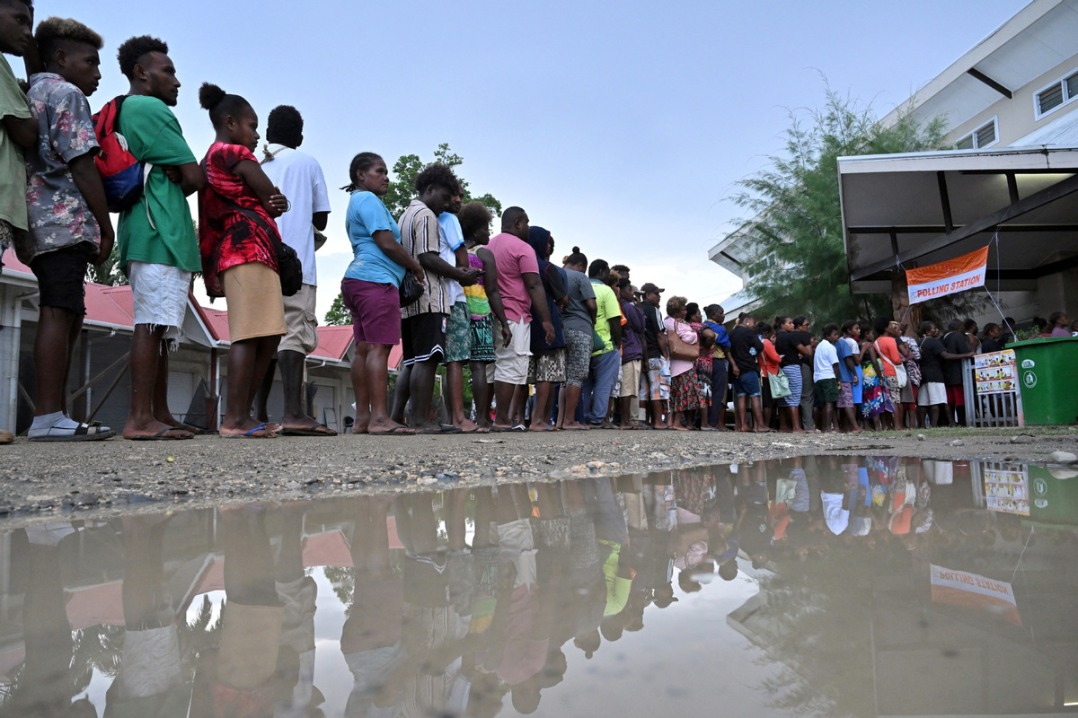Clamor for equity in climate change fight


Historical emissions should be weighed in apportioning workload, experts say
Editor's Note: As delegates look for a meaningful agreement at the COP 26 climate summit in Glasgow, Scotland, calls are growing for concrete action to aid nations most at risk from global warming.
Those seeking climate justice are raising their voice as delegates from almost 200 countries meet at the 26th United Nations Climate Change Conference of the Parties, or COP 26, with calls to consider cumulative and consumption-based carbon emissions in global climate governance.
As the almost two-week summit passed its midpoint, thousands of people took to the streets in Glasgow, Scotland, where the summit is being held, on Saturday, the Global Day of Action for Climate Justice.
They were echoed by many demonstrators in other parts of the United Kingdom and some other countries.
"We are taking to the streets across the world this weekend to push governments from climate inaction to climate justice," said Asad Rehman, a spokesman for the COP 26 Coalition, which led the demonstrations.
"The climate crisis has resulted from our broken, unequal societies and economies. We must transform our global economies into ones that protect both people and our planet instead of profit for a few."
In an analysis published last month by Carbon Brief, a UK organization, the United States was said to have released more than 509 gigatons of carbon dioxide since 1850, which outnumbered that of all other countries and is one-fifth of the world's total.
Over the same period China emitted 284 gigatons of the gas, it said.
History matters because the cumulative CO2 emissions since the dawn of the Industrial Revolution is closely tied to the 1.2 C of warming that has already occurred, it said.
The analysis found that even though certain developed countries have reduced emissions at home, they continue to rely on high-carbon imports from overseas.
When consumption-based emissions are taken into account, the US and Japan, for example, each gain 0.3 percentage points more of the global cumulative total. China's share drops by 1.1 percentage points.
Carbon Brief is endorsed by scholars and officials from many other countries, including Japan, Singapore, India and China.
In Japan, for example, scholars including Keiichiro Kanemoto, associate professor of the Research Institute for Humanity and Nature, estimated that China's exports contribute to one-third of the country's greenhouse gas emissions, the Japanese newspaper Nikkei Shimbun said.
'More from the US'
Scientific research shows that per capita emissions of cumulative carbon heat-trapping gas by the US are eight times those of China, said Chinese Foreign Ministry spokesman Zhao Lijian recently after being asked about a commentary by two Singaporean scholars in The Straits Times.
Fang Li, country director of the World Resources Institute China, said China became a carbon-net-exporting country, especially after it joined the World Trade Organization in 2001.
"The world's demand is always there," she said. "The global industrial structure hasn't changed significantly. What dramatically changed is where the production occurs."
Fang said there is a huge difference in per capita consumption between developed and developing nations, citing the US and India as examples.
With six times per capita emission difference, a US citizen's endeavor in carbon reduction can mean a significant life improvement for an Indian, she said.
If both the industrialized countries and developing countries realize zero carbon at their current development stages, the life standards of their people will be at completely different levels.
"Can this be fair?" she asked.
Tang Xinhua, an expert at the China Institutes of Contemporary International Relations in Beijing, said: "The calculation of each country's emissions cannot give a proper place to justice unless the global supply chain is taken into account."
Considering the transfer and the historical emissions of rich countries, developing countries deserve support in funding, technology and capacity building to improve their capabilities in coping with the global crisis, he said. "The lack of support will jeopardize joint global climate action."
Some developed countries have commitments to less developed countries that have not been fully met, but they want to levy import duties on countries with lower emission costs, mainly developing countries, he said. "This goes against climate justice, and it's immoral."
Angus McNeice in Glasgow and Cai Hong in Beijing contributed to this story.



































